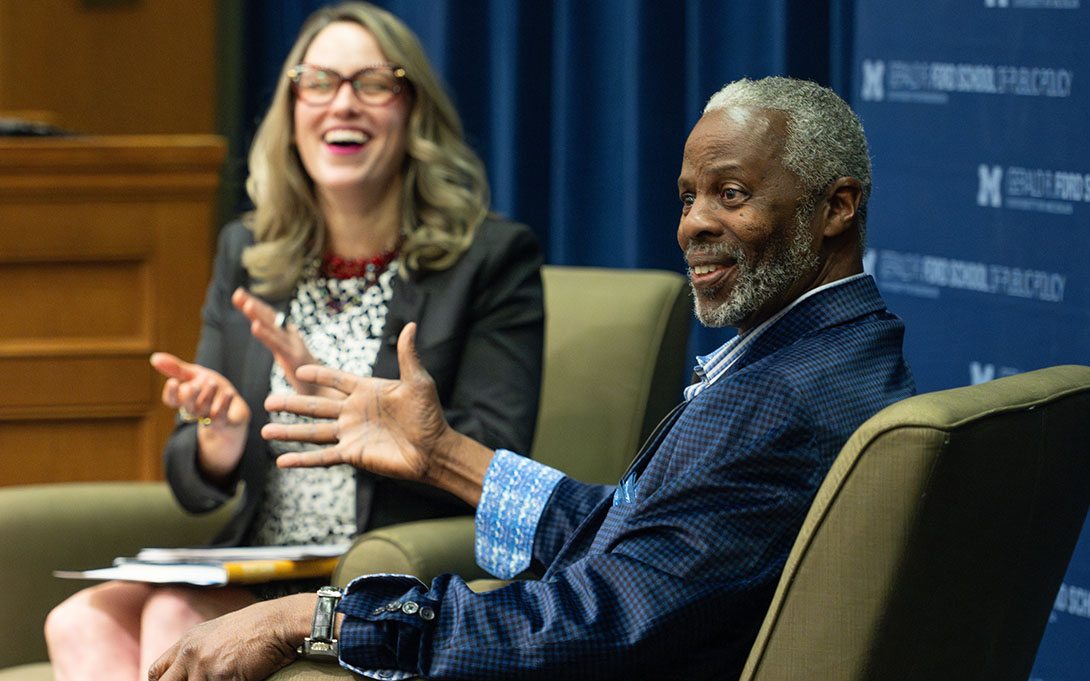
The oft-used phrase in sports “Control the controllables,” is as applicable to leadership in public policy. The phrase sits framed on Greg Harden’s desk and is the topic of his New York Times bestseller, Stay Sane in an Insane World. In November, Harden joined Ford School leadership coach Parker Tracey to discuss the importance of leadership.
First hired by Bo Schembechler in 1986, Harden has counseled hundreds of student athletes—most notably Tom Brady, Michael Phelps, and Charles Woodson—to help promote self-reflection and resilience.
“I’m not kidding when I say that one conversation with Greg changed my life,” Tracey said. “What Greg taught me, and what is so beautifully featured in his book, is this idea that you control your controllables. That your behavior matches your beliefs, every single day.”
Tracey first met Harden as a student athlete during her undergraduate years at the University of Michigan. She credits Harden with having a lasting impact on her professional career, having encouraged her to join LeaderShape, a leadership development experience for U-M students.
Harden’s perspective on leadership mirrors that of the Ford School’s Leadership Initiative, which encourages students to focus on self-awareness, resilience, and navigating conflict while cultivating the skills needed to effectively lead.
Tracey emphasized what lessons can be learned from Harden’s career as a sports professional, and pointed to the similarities between the worlds of athletics and public policy.
“It’s funny because I think a lot of people probably looked at that event and were like, ‘who is this sports guy? What does this have to do with public policy?’ In sports, everyone’s coming from different backgrounds, different worldviews, and different experiences. I think sports really is a microcosm of our general population. To succeed as a team, you must figure out how to bring people together and build each other up. This is the kind of leadership our world desperately needs, particularly in the policy realm.”
One Ford School student asked Harden what, in particular, he taught Tom Brady. Harden’s response emphasized his role in helping others engage in self-reflection.
“I can't teach Tom Brady how to throw a ball. … What I’m teaching is self-mastering. … You know yourself better than anyone knows your strengths and your weaknesses. Embrace your weaknesses.”
Harden encouraged the audience to deliberately and intentionally hone their own leadership skills.
“Leadership is a great opportunity to find out who you are and what you’re all about,” Harden said. “If you really want to be a good leader, you better learn how to listen with care, compassion, and concern and make sure that everyone is engaged. You've got to engage with your heart.”
Harden’s advice to Ford School students who want to take on the world’s biggest challenges: “I say to anyone serious about being the absolute best that they can be to embrace the pressure. It's supposed to be hard. If it was easy, everybody would do it.”
Greg Harden, M.S.W., is a life coach, motivational speaker and executive consultant who is best known for his work with 7-time Super Bowl champion quarterback Tom Brady, Heisman Trophy winner and Super Bowl MVP Desmond Howard, and 23-time Olympic gold medalist Michael Phelps. Harden began work as a student-athlete counselor in 1986 when Michigan legendary football coach Bo Schembechler brought him in after hearing of the work Harden was doing in the local community helping people deal with the challenges of everyday life and work as a clinical therapist. He meets with hundreds of athletes every year including some of the greatest athletes and coaches of all time in their respective sports, like Jalen Rose, Olympians Emily Brunemann, Jeff Porter and Olympic legend Michael Phelps to name a few. Besides sports, Harden has provided performance coaching to corporate executives and community leaders. He has trained hundreds of managers and administrators on ‘managing trouble employees’